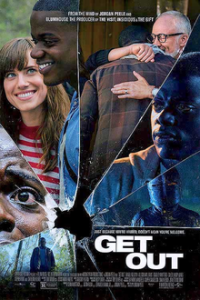 Parables come in all sizes and shapes, horror movie-shaped, some of them.In my perpetual struggle to catch up, I finally got to see Get Out.One of the raft of well-made, intelligent horror films that have been released recently, it’s been out long enough that I suspect my spoilers will be well known.The Armitage family, resident in upstate New York, has been kidnapping and using African-Americans to make up for the perceived weaknesses of their family and friends.One of their main means of obtaining victims is through their daughter Rose, who brings her boyfriends home for the weekend so they can be hypnotized by her psychiatrist mother and operated on by her neurosurgeon father.The reveal comes slowly, but the discomfort begins early on.
Parables come in all sizes and shapes, horror movie-shaped, some of them.In my perpetual struggle to catch up, I finally got to see Get Out.One of the raft of well-made, intelligent horror films that have been released recently, it’s been out long enough that I suspect my spoilers will be well known.The Armitage family, resident in upstate New York, has been kidnapping and using African-Americans to make up for the perceived weaknesses of their family and friends.One of their main means of obtaining victims is through their daughter Rose, who brings her boyfriends home for the weekend so they can be hypnotized by her psychiatrist mother and operated on by her neurosurgeon father.The reveal comes slowly, but the discomfort begins early on.
Released early in the Trump White House tenure, the movie is a study in an intense xenophobia that nestles somewhere between Guess Who’s Coming to Dinner and The Stepford Wives.It’s inherently uncomfortable watching Chris Washington, the protagonist, being treated as if his very presence requires constant comment in the world of white privilege.He, of course, had misgivings before ever climbing into Rose’s car, but her convincing display of liberalism was enough to overcome his hesitation.For me, watching the film made it clear that privilege is something assumed, even when it isn’t had in any explicit way.The Armitage family and their friends are well-to-do but even if the setting were more mundane the message would still have worked—our culture imposes and reimposes its message of white superiority in subtle ways that the camera captures here.
Quite apart from its nature as a parable, Get Out is a demonstration of the social consciousness of horror.Its reputation as a debased, low-brow appeal to all that’s unsavory to watch is misplaced at times.While Get Out is uncomfortable it’s that way for a reason.Were it not, it would lose its important message.All privileged people need to be able to see through the eyes of those who are culturally disenfranchised, and although the “us versus them” mentality is problematic it has to be faced honestly and openly.The very fact that a human construct like race could be used as the basis for a horror film in America raises questions that ought to make all of us squirm.Setting the story in New York, where prejudice might be supposed not to remain only underscores how deeplyits roots have grown.Horror with a conscience is perhaps as much a vehicle for social change as it is a genre more honest than often supposed. That’s how parables tend to be.
